- Home
- Jeremy Robinson
Savage (Jack Sigler / Chess Team) Page 16
Savage (Jack Sigler / Chess Team) Read online
Page 16
The colonel was more ambitious than intelligent, but at least he knew how to carry out his assignments, which was more than could be said for her men in London, who had not only let Mulamba escape but had subsequently lost track of him. She had given them an hour to fix their mistake. Fifty-eight minutes later, her phone rang.
“Ace Diamonds,” the caller said.
“I hope you have something good to tell me,” she replied.
“Um, I’m not sure exactly.” Ace Diamonds had, up until about fourteen hundred hours, Universal Coordinated Time, been Four Diamonds, and was still getting used to his new position of responsibility. “We’re spread kind of thin here, but we’ve got the international terminals covered…at Heathrow, I mean…”
“Stop!” Favreau closed her eyes and took several breaths to control her rising ire. Despite his ultimate failure, the previous Ace Diamonds had at least been self-motivated and marginally intelligent. “What exactly do you plan to do if he happens to wander past you?”
“Well…”
“He won’t be traveling in the open. He’s not that stupid. The only way to regain a strategic advantage is to think one step ahead of him. What other ways are there for him to leave the country?”
“Ah, military transport?”
“If he had the support of the British Government, we would know about it.” Favreau considered her own question. “He was there to get that support. Would he leave without it?”
“Uh…”
“It was a rhetorical question. He has unfinished business. Where exactly was he when you took him the first time?”
There was a long pause, as if the man was asking someone else for the answer. “He was at the Royal Geographic Society.”
That was a surprise. Mulamba had been in the United Kingdom to build support for his African federation. Why would he visit a historical institution? She caught herself before asking Ace for more information—that way lay madness.
“Stand by,” she said, and ended the call. She immediately placed another, calling a directory assistance number for London. A few minutes later, she was talking to a receptionist at the RGS.
She introduced herself as a French journalist, covering the situation in the Congo. “I am trying to get some background information about the abduction of President Mulamba. I understand that he had just left your offices when he was taken?”
The receptionist passed her off to one of the directors who came on the line armed with a carefully worded legal statement, which could be distilled down to two basic words: no comment.
At the other end of the line, Favreau just smiled. She liked a challenge, and as a seasoned intelligence operative, she knew a thing or two about interrogations. In a voice that was seductive in its helplessness, she said, “I have no wish to scandalize your institution. It’s only that the citizens are wondering why President Mulamba would have left at such a critical time. If you could only help me to understand what he was trying to accomplish…” She let the request hang, allowing the man to fill in the blanks.
She could hear the inner conflict in his voice. “Yes, of course. I understand. It’s just that I can’t comment on the matter. You see, there’s to be an inquest, and…well…”
“Oui, of course. But if you could only just tell me why President Mulamba came to see you, how could that little thing matter? It could be our little secret. You could be my ‘unnamed source,’ no?”
“Ah…I…well… He was very interested in the diaries of Sir Henry Morton Stanley. Some foolishness about missing pages.”
“Missing pages?”
As Favreau expected, that minor concession broke the dam of his resistance. “Yes, it seems that Stanley removed several pages from his diary, relating to his meeting with Livingstone. No one quite knows why, but I’m sure there’s a reasonable and quite mundane explanation.
“We didn’t have what he was looking for. I’m not sure the pages even exist. If Stanley tore them out, he would surely have gone the added step of tossing them in the fireplace. I suggested he try the Royal Museum for Central Africa near Brussels. They have the largest collection of documents relating to Stanley, so if the pages exist, they would be there.”
Favreau rang off without another word and immediately called Ace Diamonds.
27
Tervuren, Belgium
Queen got out of the taxi and did a quick 360 degree visual sweep, before stepping aside to allow Mulamba to climb out. Rook, who had been up front with the driver, got out as well, passing over a handful of Euro notes that generously exceeded the amount shown on the meter.
“It is as I told you,” the driver said in French. “The museum is closed. Are you certain you wish to be dropped off here?”
“Yes,” Mulamba insisted. “This is where we need to be. Thank you.”
Queen frowned, wondering if they would not have been better off taking the driver up on his offer and going to a nearby hotel instead. They were too noticeable as it was, and the taxi driver wasn’t likely to forget them or their destination. But there was no reasoning with Mulamba, and it probably wouldn’t make much difference anyway. They would be done and out of the country long before anyone realized that the missing Congolese president was skulking around a museum in Belgium.
The Royal Museum for Central Africa was housed in a stately palatial structure in the municipality of Tervuren, just a short drive from the capital city of Brussels. The museum grounds appeared completely deserted. The small parking area opposite the museum entrance was empty, except for an enormous statue of a trumpeting elephant that guarded the path into the beautifully cultivated, but uninhabited, forest park surrounding the edifice. The utter lack of activity was due, in part, to the lateness of the hour, but was also because the museum was closed to the public for renovations, which were expected to last several years.
They had only learned of the renovation during the two-hour train ride from London to Brussels. While this development had thwarted Mulamba’s goal of finding a scholar or curator to walk him through the Stanley archives, Queen had seen it as a blessing in disguise.
“We’ll sneak in, find what you’re looking for, and get out before anyone knows we were there,” she told him. “Zero footprint.”
The African president had not been particularly happy about the idea of breaking and entering, but his eagerness to find the missing pages of the Stanley diary far outweighed his moral restraint.
Which left only the question of how they would actually accomplish the break-in.
“Leave that to me,” Lewis Aleman had told her.
Aleman was the team’s tech guru. Someone—probably Rook—had once jokingly referred to him as R2-D2, because of his uncanny ability to solve any problem related to computers or electronic systems. The resemblance to the mech-droid from the Star Wars movies stopped there however. Aleman was a tall, lean, endurance athlete and former Special Forces sniper. A combat injury had taken him permanently out of the field, but over the years, he had done more to ensure the success of Chess Team missions from his computer console than he ever could have with a long-range rifle. Although the original design was not his, Aleman’s technical savvy had made the quantum computer network a reality, leapfrogging developments in the private sector by decades. If anyone could get them past the security in the museum, it was Aleman.
What was unusual was that Aleman was now communicating with them directly. “Deep Blue is wrapped up with the situation in the Congo,” he had told Queen, “so you’ll be dealing with me directly.”
That wasn’t a problem for Queen, but she was concerned about the matter that now occupied Deep Blue’s attention. She knew that King and Asya had escaped custody in Kinshasa, and that they were now launching a raid on the national palace, but there had been no word from Bishop and Knight, and it was clear that Deep Blue feared the worst.
Queen couldn’t quite bring herself to believe that her teammates were dead. Bishop had always seemed indestructible to her, even before he had been
given the regen serum. The fact that he had survived the dire side-effects of that serum, which transformed ordinary people into unstoppable rage monsters, had only deepened her sense of his invincibility. Even though he—like King—was now one hundred percent mortal again, she still couldn’t imagine him dead, especially not at the hands of a few rebel fighters.
It was difficult to believe that Knight was gone, too, though for much different reasons. She had known Knight longer than anyone on the team. They had worked together in her first field assignment. He was always calm and coolly professional, essential to the success of any mission, and yet at the same time, almost invisible, which for a sniper was a critical skill. Even though she often forgot he was there, she couldn’t imagine a world without him.
It had been Bishop’s quiet invocation of the Special Forces motto that had prompted her decision to help Mulamba in his crazy quest. Like him, she felt a keen desire to defend the defenseless. If Bishop and Knight had made the ultimate sacrifice on behalf of the innocents living in the Congo region, then she was going to make damn sure that it wasn’t for nothing.
As eager as she was for news—good or bad—she understood the importance of staying focused. King and Asya needed Deep Blue’s full attention, and as it happened, she and Rook needed Aleman’s expertise.
They strolled along the fringe of the park until the taillights of the departing taxi disappeared from view, then they reversed directions and headed back down the brick sidewalk that ran the length of the museum’s north wall. Just beyond the building’s corner, illuminated only by streetlights, a wrought iron fence blocked access to the museum campus. The gate to the staff parking lot just beyond—also empty—was secured with a heavy padlock.
“Stealth mode activated,” Aleman said. “I’ve looped the security camera feed, so you’re invisible for the moment, and I’ve bypassed the alarm. Not much I can do about that padlock though.”
“We’ve got that,” she replied, and turned to Rook. “Got the picks?”
He took a slim wallet from his back pocket. They’d left their weapons in the trunk of the sedan at a car park in London, but had managed to slip a few other items through the train station security checkpoint, including a set of carbon composite lock-picks.
“I got this,” he announced.
“You know I’m better with the…” she licked her lips seductively, “delicate stuff.”
“Nice try, babe,” he replied in the same tone. “But I’m the key master.”
“I’ll flip you for it.” She made a show of checking her pockets, then said, “Got a quarter?”
Rook rolled his eyes, and jammed his free hand into the front pocket of his jeans. Queen casually took the pick case from him so that he could check the right side, and as he did, she spun around and went to work on the lock.
“Call it in the—hey!”
The lock released with an audible click and Queen handed the picks back to him. “Told you. You’d still be fumbling around trying to get it in.”
Mulamba laughed, and Rook shot him a venomous look before turning back to Queen. “You have the glasses. That’s cheating.”
“That must be it.” She patted him on the shoulder, then pushed the gate open just enough to permit access. Rook entered first. As Mulamba passed through the opening, she followed and pulled the gate shut again.
Queen’s research indicated that they would find what they were looking for in the Stanley Pavilion, a three-story satellite structure a short walk from the museum palace. They moved quickly to the elegant pillared porch and found the main entrance door, locked.
Rook stepped forward and went to work with the lock-picks, trying several before finding one that he thought would do the job. After a full minute of teasing the tumblers, he said, “These institutional locks are a lot trickier than a big ass padlock.”
“Uh, huh.”
Finally, the door yielded, and he pushed it open with a flourish.
Queen led the way, her glasses revealing details about the darkened interior of the pavilion that were hidden from unaided eyes. She saw that several of the display cases were empty, while others contained what looked like nothing more than a collection of dusty old knick-knacks without any sense of continuity. In an age of high-tech interactive displays and immersive environment, the Royal Museum was itself a relic from another age.
“I can see why they thought it was time to renovate.”
“Well, it’s good that one of us can see something,” Rook said.
“Don’t get all pissy just because I take better care of my things.”
“Oh, is that how you remember it? Because I—”
“Are you guys always like this on a mission?” Aleman cut in.
Queen smiled but didn’t reply. Banter was standard operating procedure for Rook, but as a rule she didn’t engage in it with him during a mission. Right now though, the good humor was a welcome distraction from the uncertainty surrounding the rest of the team’s fate, a situation which left her feeling helpless.
They made their way to the reading room, where to their disappointment, they found rows of empty shelves. A computer terminal sat idle on a desk near the entrance, and at Aleman’s direction, she booted it up. A password prompt appeared on the screen.
“Hang on,” Aleman said. “The good news is, I’m already in the museum’s WiFi network… Okay, try this.” He rattled off a string of letters, numbers and characters, which she entered on the keyboard, and when the desktop appeared a moment later, Aleman began remotely searching the directory. Queen watched as file folders and spreadsheets began opening on the screen.
“Okay,” he said, after several minutes of silence. “The Stanley archive is still in the building, but has been moved to conservation storage, just down the hall.” He gave her directions to the nearby room, along with the number of the container with the relevant documents.
The storage room was crowded with plastic totes, each labeled with an inventory sticker. The room had no windows to the outside, and with Aleman’s permission, Queen told Rook to turn on the lights.
Still squinting from the change in illumination, Mulamba began scanning the stickers. He seemed to have a sense for the way the collection had been organized, and he found the correct case without consulting the catalogue number Queen had provided.
“Here,” he said, his voice bubbling over with enthusiasm. “This is the one.”
He loosed the clasp and opened the lid to reveal a nest of packing paper, and several bound books, each vacuum sealed in heavy cellophane and marked with another sticker. He held up one of them. “This is the diary in which Stanley recorded his meeting with Livingstone.”
“I thought he tore out those pages,” Rook said.
Mulamba nodded. “That is what has been reported. Still, it is a place to start.” He pinched the plastic between his fingers and tried, without success, to tear apart the protective overwrap.
Rook rummaged in the desk and found a pair of scissors. “Try these, Joe.”
“And be careful,” Queen added. “Let’s not add anything else to the list of crimes we’re committing.”
Mulamba seemed not hear her as he sliced open the packet and took out the journal. He thumbed through it quickly, scanning the dates at the top of each page until he found the entries from November of 1871. His expression fell just a little.
“It is true. The pages have indeed been removed.” He looked uncertainly at the container but made no move to take anything else from it.
Queen spoke to Aleman in a low voice. “Any suggestions?”
“Wait one. Okay, there is a collection called ‘miscellany.’ Loose papers, looks like scientific notes, personal letters and so forth. Should be in the same container.”
She relayed the message to Mulamba who commenced rooting in the packing material like a kid tearing into a Christmas present. His enthusiasm outpaced Rook’s valiant effort at keeping the discarded items in some semblance of order, but after a minute or so, the Afric
an president held up another sealed package containing a dark brown manila folder. Mulamba cut it open and shook out several yellowed envelopes. He thumbed through them quickly, glancing at the delicately scripted name on each, before shuffling it to the bottom of the stack.
Rook chuckled and muttered, “Bills, bills, junk mail, bills.”
Mulamba let out an excited cry and held up an envelope. “This is addressed to John Rowlands, esquire.”
“And that’s good?”
“John Rowlands and Henry Morton Stanley are one and the same. Stanley was born as Rowlands…forgive me, that’s not quite correct. There is uncertainty as to his parentage. His mother abandoned him as an infant and Rowlands, the man he believed to be his father, died shortly after he was born. In any event, he took the name Stanley when he was eighteen.”
“So what is that?” Rook asked. “Letters to my former self?”
“It is unopened,” Mulamba said, breathlessly. He broke the wax seal and teased out the folded paper inside.
Queen saw his eyes moving back and forth as he read the contents, growing wider as he digested the information contained therein. Right up to that moment, she had been expecting the search to end in disappointment, a wild-goose chase, which she had agreed to only to placate the African leader. Now, she knew better.
“Aleman, it looks like we got what we came for. Tell Crescent II to come get us, ASAP.”

 Alter
Alter From Above - A Novella
From Above - A Novella Flux
Flux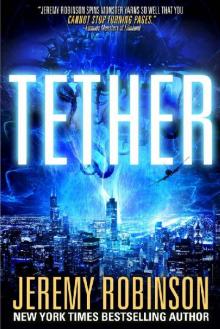 Tether
Tether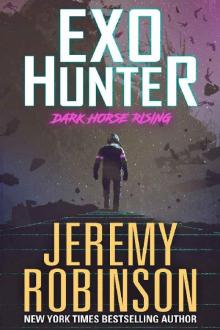 Exo-Hunter
Exo-Hunter Pulse
Pulse Cannibal
Cannibal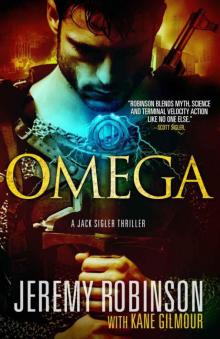 Omega: A Jack Sigler Thriller cta-5
Omega: A Jack Sigler Thriller cta-5 Flood Rising (A Jenna Flood Thriller)
Flood Rising (A Jenna Flood Thriller)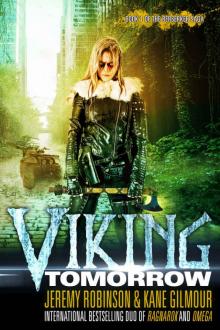 Viking Tomorrow
Viking Tomorrow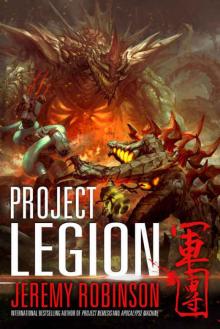 Project Legion (Nemesis Saga Book 5)
Project Legion (Nemesis Saga Book 5) BENEATH - A Novel
BENEATH - A Novel Kronos
Kronos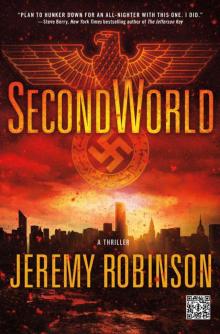 SecondWorld
SecondWorld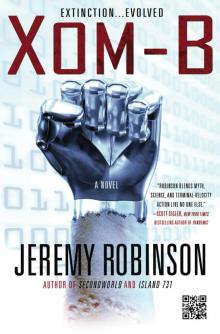 XOM-B
XOM-B Forbidden Island
Forbidden Island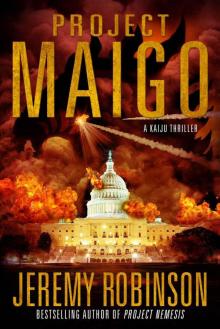 Project Maigo
Project Maigo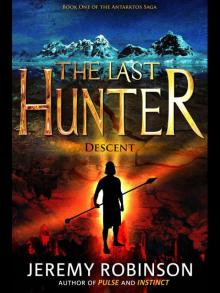 The Last Hunter - Descent (Book 1 of the Antarktos Saga)
The Last Hunter - Descent (Book 1 of the Antarktos Saga)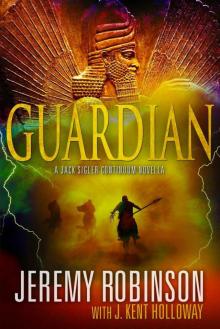 Jack Sigler Continuum 1: Guardian
Jack Sigler Continuum 1: Guardian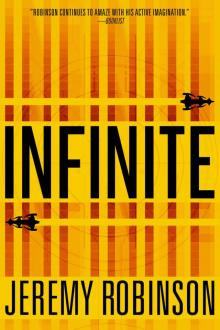 Infinite
Infinite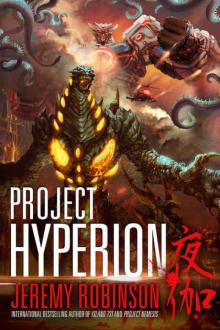 Project Hyperion
Project Hyperion The Distance
The Distance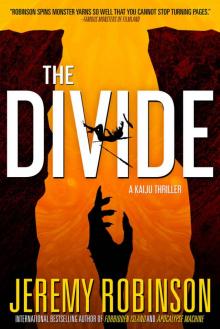 The Divide
The Divide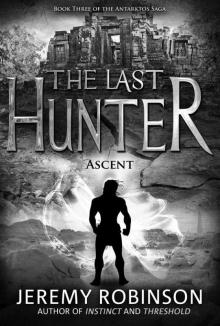 The Last Hunter - Ascent (Book 3 of the Antarktos Saga)
The Last Hunter - Ascent (Book 3 of the Antarktos Saga)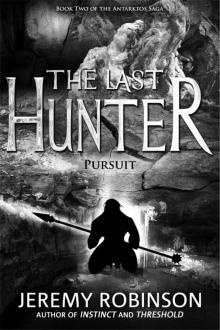 The Last Hunter - Pursuit (Book 2 of the Antarktos Saga)
The Last Hunter - Pursuit (Book 2 of the Antarktos Saga) Raising the Past
Raising the Past The Others
The Others The Last Hunter - Collected Edition
The Last Hunter - Collected Edition Threshold
Threshold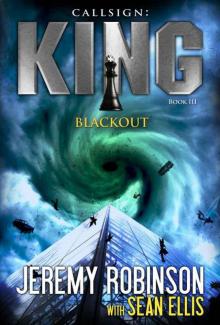 Blackout ck-3
Blackout ck-3 Antarktos Rising
Antarktos Rising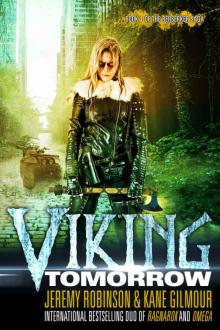 Viking Tomorrow (The Berserker Saga Book 1)
Viking Tomorrow (The Berserker Saga Book 1)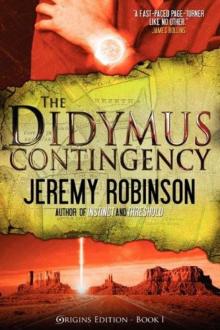 The Didymus Contingency
The Didymus Contingency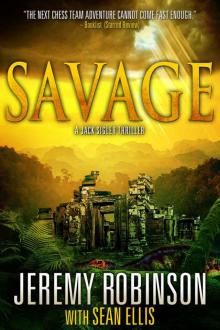 Savage (Jack Sigler / Chess Team)
Savage (Jack Sigler / Chess Team)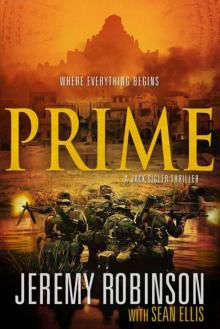 Prime
Prime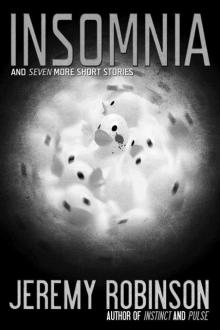 Insomnia and Seven More Short Stories
Insomnia and Seven More Short Stories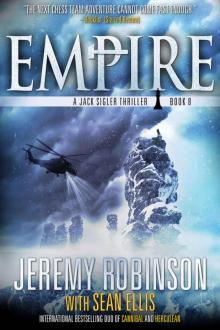 Empire (A Jack Sigler Thriller Book 8)
Empire (A Jack Sigler Thriller Book 8)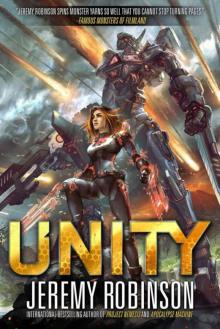 Unity
Unity Instinct
Instinct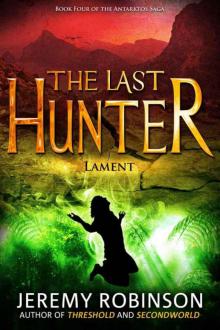 The Last Hunter - Lament (Book 4 of the Antarktos Saga)
The Last Hunter - Lament (Book 4 of the Antarktos Saga)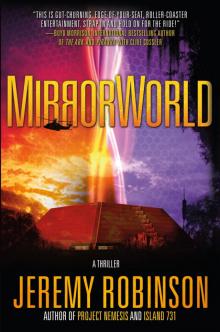 MirrorWorld
MirrorWorld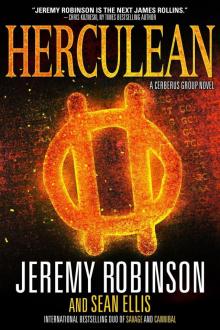 Herculean (Cerberus Group Book 1)
Herculean (Cerberus Group Book 1) Island 731
Island 731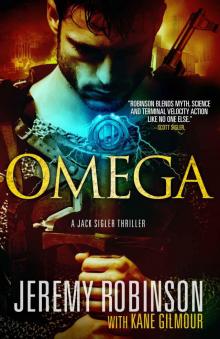 Omega: A Jack Sigler Thriller
Omega: A Jack Sigler Thriller Patriot (A Jack Sigler Continuum Novella)
Patriot (A Jack Sigler Continuum Novella) 5 Onslaught
5 Onslaught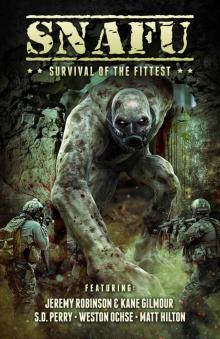 SNAFU: Survival of the Fittest
SNAFU: Survival of the Fittest Helios (Cerberus Group Book 2)
Helios (Cerberus Group Book 2)